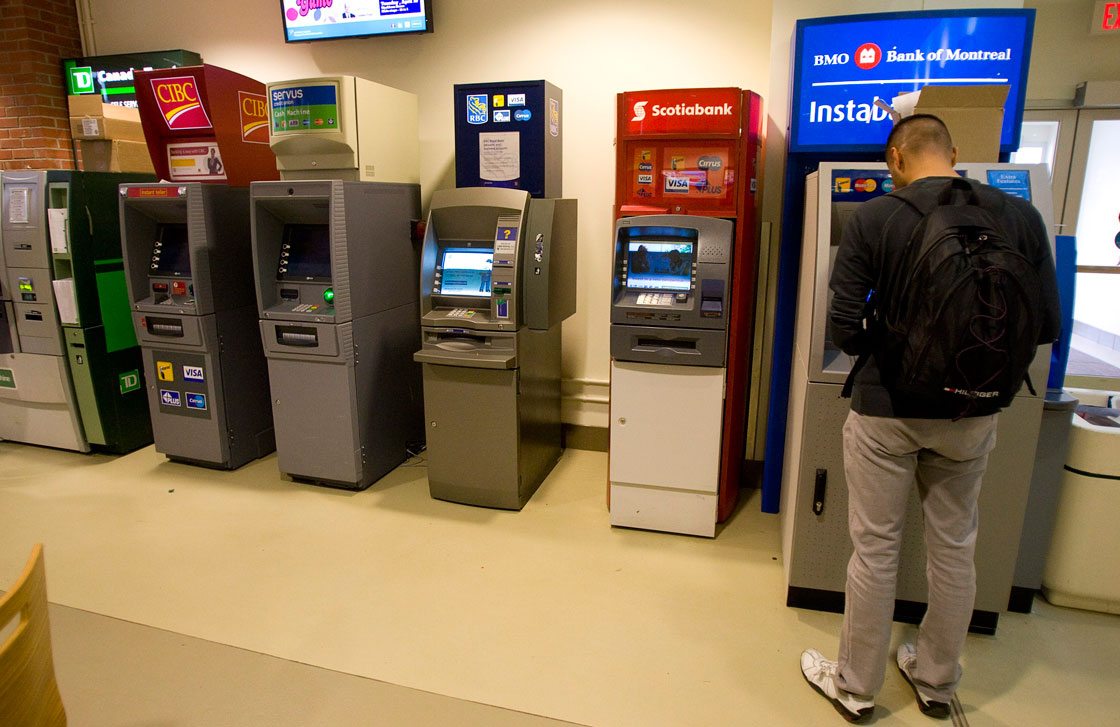Some customers of Canada’s big banks are beginning to notice the wave of higher monthly fees that’s about to hit them.

Jeff St. Pierre, a London, Ont.-based psychologist and long-time Bank of Montreal customer says he feels betrayed by BMO after the bank notified him last month the terms of his account were being changed, and those changes would amount to potentially hundreds of dollars in new fees.
St. Pierre was sent a letter on March 16 telling him his no-fee plan was being eliminated on May 1, and that the bank was automatically shifting his account to its “Practical” plan, a no-frills account that will carry a new $4 charge each month starting May 1.
The plan also dramatically restricts the number of free transactions before St. Pierre is charged for subsequent times he moves money in or out of the account each month—to pay for bills for example or make a mortgage payment.
MORE: Tired of bank fees? Here’s some alternatives
Pay to pay
The practice is known as “pay to pay” because customers literally pay a fee in order to make a payment.
Last September, the federal Conservatives banned pay-to-pay fees for big wireless and Internet providers who wanted to charge customers as much as $6 for sending them their bill by mail. Banks should have been included in the ban, according to Andrew Cash, the federal NDP critic for consumer protections.
“They didn’t include banks in their ban. And now we’re seeing pay-to-pay on steroids from banks,” Cash, the MP for Davenport in Toronto, said by phone on Thursday.
WATCH: NDP wants to end pay-to-pay fees
MORE: Canada’s big banks rolling out higher fees on customers
BMO is capping its Practical plan at 12 transactions a month. After an account holder exceeds that, BMO will charge them $1.25 (another hike of $0.25 on May 1) for any subsequent transactions.
St. Pierre’s old plan had unlimited transactions, something he can only get now by moving to a more expensive bank plan, or by carrying a $1,500 balance at all times.
By his count, St. Pierre makes 45 transactions a month, a number that will amount to $41.25 in fees each month ($495 annually). He’s switched to a more expensive plan, he says, that allows for unlimited transactions.
Not alone
BMO isn’t alone among the banks in introducing new pay-to-pay fees while lifting costs on customers in others ways (like the $1 across-the-board increase on common “Everyday” plans that kicks in tomorrow as well).
On June 1, customers at RBC face new pay-to-pay fees for routine banking duties, too. Some RBC account holders will be charged $5 for making a mortgage payment, or $2 for making a payment on another loan as part of a series of changes to account policies.
TD Bank introduced revised rates on April 1, while CIBC and Scotiabank – the remaining two of the country’s “Big Five” banks – were the first to change account terms earlier in the year. The moves will help pad the hundreds of millions in annual revenue the five banks generate from such charges, experts say, but lifting day-to-day banking costs for customers in the process.
“Now you’re paying a fee to pay your mortgage, you’re paying a fee to pay your student loan. You’re paying a fee to pay your credit card bill, you’re even paying fee on a kids savings account when you put money into it,” Cash said.
Get proactive
Though not happy about the new fees, the charges aren’t the main rub, for St. Pierre. It’s the manner and message in which BMO delivered the changes – telling the customer of 20 years that the Practical plan would “better serve” his banking needs.
After heading to his branch to air his grievances, he’s paying $15 a month for unlimited transactions – still more than his old no-fee account but well below what he would’ve been dinged had he been less inquisitive.
‘It’s important to not be a complacent consumer.’
St. Pierre says he wonders how many BMO customers in his shoes “ignored a mass mailing I happened to read by chance.”
“It’s important to not be a complacent consumer. It’s common for people to have a chequing account with their home bank and not be aware of the fees associated with it,” Penelope Graham, editor of ratesupermarket.ca, a site that tracks interest rates and fees at financial institutions.
“You might have an annual fee or a monthly fee you know of, but you might not know where else you’re getting dinged.”
Voluntary code
Canada’s Big Five banks have each agreed to “Voluntary Commitments and Codes of Conduct” that govern their behaviour and dealings with customers. The non-binding rules and guidelines have been developed by the industry and the federal government and in some cases, other groups, according to the Canadian Bankers Association.
Cash said the slew of new fees that are about to hit bank customers go against the spirit of the voluntary code, and shows that binding rules should replace self-regulation.
“These should be prohibited. The government should bring in an expanded code of conduct and it should not be voluntary,” he said.



Comments